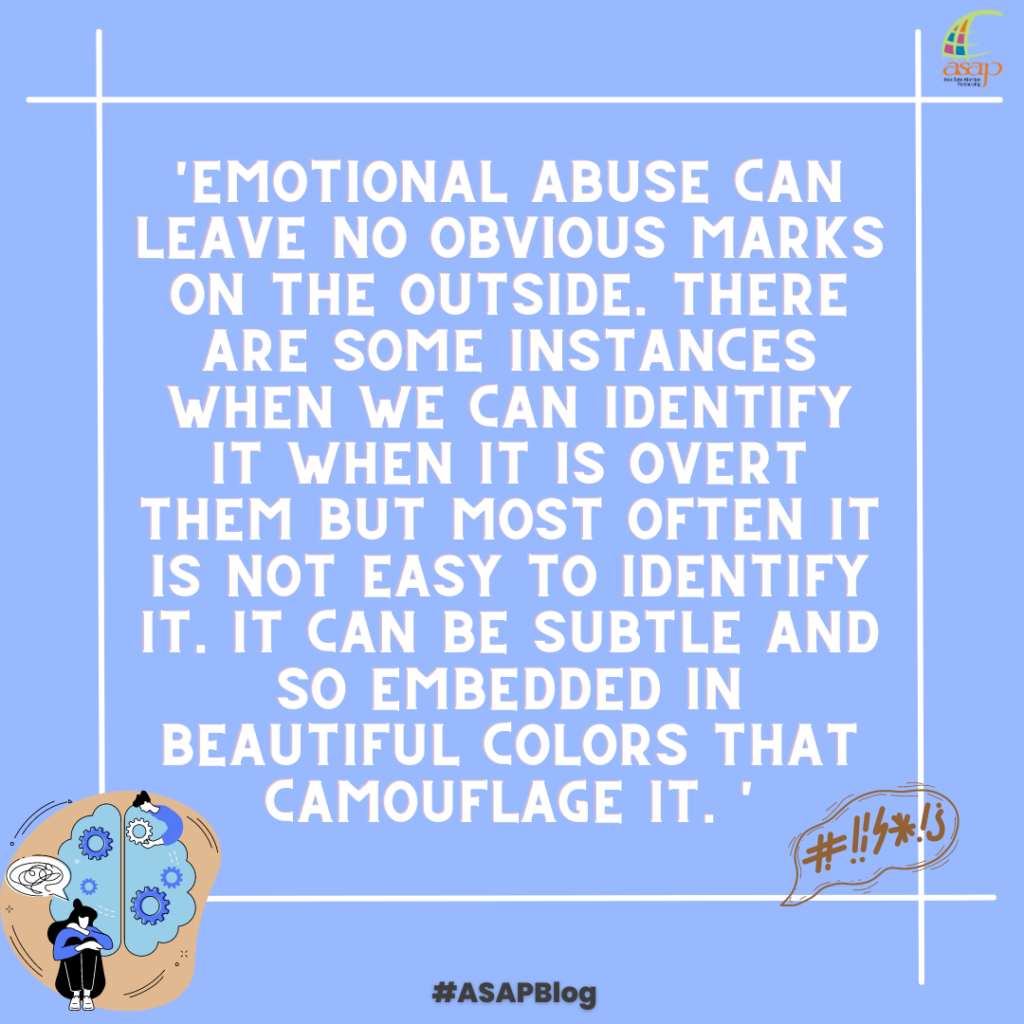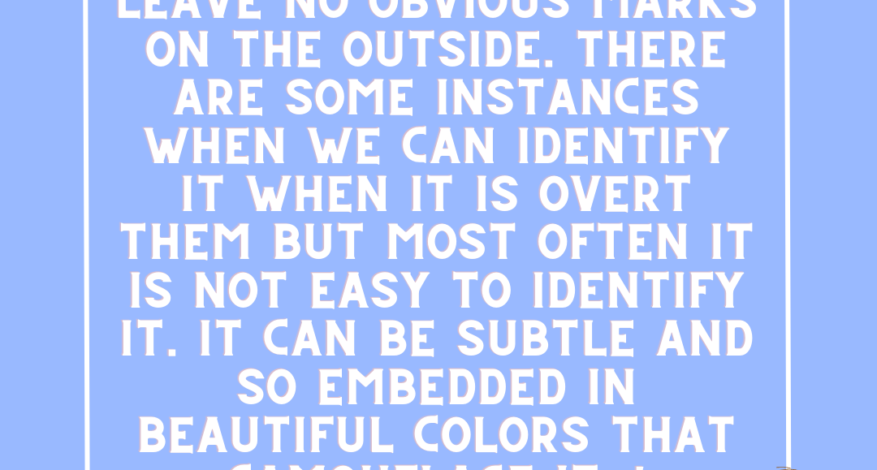The Invisible Violence- By Priskila Arulpragasam

‘You know I like you a lot, you are an amazing person, but you need to lose some weight. You know I want my girl to be pretty’.
He told me this because he cares right? It is true that I am fat, and I need to shed some weight. He treats me well and is very caring, so he means no harm, this is not violence or abuse…………or so I thought. But it did not stop here. After some time I started hating myself, every bit of me. My confidence was gone and I was trying hard to please someone by trying to be someone I was not.
I always thought that violence and abuse was straight forward and is easily identifiable. We think we will know when violence and abuse happens within any kind of relationships. This is true most often for physical violence where the act of violence or abuse cause physical pain or effects.
But in cases of emotional, mental or economic abuse it is not straightforward or overtly visible at all times. (I want to note that sexual violence can be both visible and invisible, but I will not be talking much on that topic in this piece.)
Emotional abuse can leave no obvious marks on the outside. There are some instances when we can identify it when it is overt them but most often it is not easy to identify it. It can be subtle and so embedded in beautiful colors that camouflage it. You believe that the relationship is beautiful and loving but the relationship cripples you from within even without you realizing it. You are happy, you want to be happy, but somewhere deep down you are also not happy because of the things that are happening.
You are unable to identify the toxicity in the relationship because the mental and emotional abuse is dipped in honey and rosy colors. Most movies we watch and stories we read (including fairy tales!) tend to romanticize these behaviors and leave us unable to distinguish between romance and toxicity.
Women tend to think that the partner is controlling her mobility because he wants to protect her. People around us may tell us that a man is scolding you because he loves you, that is how he expresses his love.
But even if your mind is unable to or refusing to recognize this as abuse, the symptoms start reflecting in various parts of your life— your body, your work, your mental health, your other relationships
The other person is great, they care, they do things for you and nothing can be wrong with them. So then logically, you wonder, if this unhappiness or discomfort you feel is your own fault. You start believing that in fact something is wrong with you and that is why the other person is acting a certain way. This is self-gaslighting!
Many women and girls spend many years in such relationships, believing that they are at fault or that what they are facing is out of love and the protection their partner offers. It is not easy to leave these relationships as we become dependent on our abuser for affirmation and validation for ourselves. Because of our cultural and traditional norms, women may believe that their previous sexual relationships, choice of fashion, having strong opinions is the reason for all this, and they have to endure this abuse because it was something wrong that they did and the man is nice enough to accept them with that past.
Even after leaving such relationships, it can take many years to recover from the effects of the trauma. When you finally leave the relationship or it is ended in the way you never expected it to, you start blaming yourself and you are unable to forgive yourselves.
Our culture and norms add up to this by creating the gender script for a woman by which she should act and this script teaches her to be submissive and fulfill the demands of patriarchy without questioning or challenging it. The list of what a ‘good woman’ should be is taught to girls from such a small age that they grow up internalizing this and are blinded by the norms to the subtle violence and abuse that happens to them daily.
Even today many women are dependent on their partners and are burdened by the unpaid care work within households which makes them financially dependent, and forced to believe that their survival is within this toxic relationship. The society also places the responsibility of holding the family together and caring for children on the shoulder of a woman and it is the women are shamed and stigmatized when the family unit ‘breaks’ even though she is facing emotional abuse and torture on a regular basis and there is no support for her. Many women endure toxic and abusive relationships for decades due to these reasons.
We have all been here, we have all thought that the fault is ours.
But no, YOU ARE OKAY. THERE IS NOTHING WRONG WITH YOU. IT WAS WHAT HAPPPEND TO YOU THAT IS NOT OKAY.
It was never your fault; it was the fault of the person who mistreated you. You acted the way you acted as a reaction to what happened to you and your reaction was okay. The problem was the other person. Many women may think that something they did caused this, and they should take some blame for what happened. BUT THIS IS NOT TRUE, YOU ARE NOT TO BE BLAMED FOR WHAT YOUR ABUSER DID.
It may take months and years for us to forgive ourselves, understand that, accept that what happened was not our fault. This journey is not easy and even after you come to terms with all this, the trauma may come out at different points but be kind to yourself.
You may think that you are alone, and no one will understand you, no! my dear friend you are not alone. I am with you, many other women like you and I are here. So do not suffer in silence, talk to a trusted friend. Therapy is a great way to heal, there is no shame in seeking help. Trauma will change you; you may never be able to be the self you were before and that is okay. I am not going to say here that the trauma made you stronger or it was for good. What happened was bad and it has impacted you, sometimes our trauma and pain will start to define us and write our stories before we start writing it.
Just be aware of the triggers, try to understand yourself, be self-aware and most of all be gentle towards yourself. Give yourself the love and space to heal.
Give yourself second chances and let yourself be loved.
Priskila is an alumni Youth Champion from Sri Lanka and an active member of Youth Advocacy Network Sri Lanka






